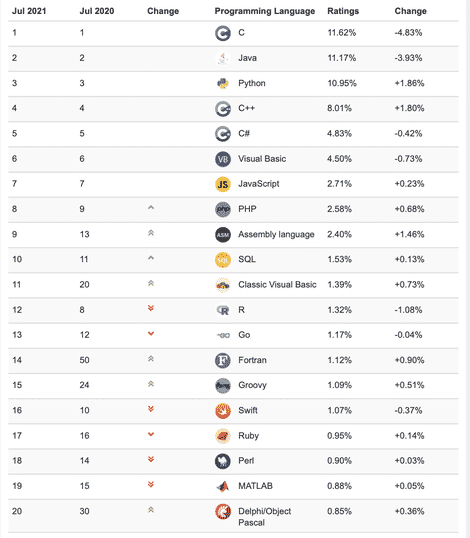On the other side, Python is an interpreted, object-oriented, high-level programming language with code examples that may be executed on a computer. High-level data structures, coupled with dynamic type and dynamic binding, making it a highly appealing choice for Rapid Application Development as well as a scripting or glue language for connecting existing components. In addition, Python’s straightforward, simple-to-learn syntax promotes readability, which lowers the overall cost of program maintenance.
Rankings of Programming Languages
C and Java continue to be the most popular programming languages according to the Tiobe community index, but Python is closing upon them and will certainly overtake them soon. In Tiobe’s July 2021 index, the three most popular programming languages are C, Java, and Python, according to the most recent data available. Even though the ranking has not changed, Tiobe CEO Pau Jansen points out that the gap in perceived popularity between C and Python is surprisingly tiny, with just 0.67 percent between the two languages. “As a result, the next several months are going to be quite exciting. Which language will emerge victorious from this conflict? Python seems to have the greatest potential of becoming the number one programming language, owing to its market leadership in the growing fields of data mining and artificial intelligence, among other things “Jansen took notice of this. To compile Tiobe’s index relies on search keywords that developers, scientists, students, and software engineers enter into major worldwide search engines. Developer analyst RedMonk has a different approach, which examines language use in software projects published on GitHub and in developer Q&A forums such as Stack Overflow, among other places.
JavaScript is still the most popular
According to RedMonk’s Q1 2021 rankings, JavaScript is the most popular scripting language, followed by Python and Java. A staple among programmers tasked with creating machine-instruction code is C, which was developed at Bell Labs almost 50 years ago. When compared to last July, searches for the letter C was down 4.83 percentage points. Java searches decreased by 3.93 percent over this time period, whereas Python searches increased by 1.86 percent. C++, C#, Visual Basic, Javascript, PHP, Assembly Language, and SQL are among the top ten programming languages, behind only C, Java, and Python. Another intriguing change is taking place in the world of Rust, a programming language developed by Mozilla to give memory safety guarantees that are currently missing in C and C++ programs. Technological behemoths are considering adopting Rust because they are unable to keep up with the number of security vulnerabilities, the majority of which are memory-related. A lot of momentum is building behind Rust right now. This includes attempts by Google to establish Rust as a major programming language for the Android operating system, as well as a drive to establish Rust as a second programming language for Linux kernel development. Rust’s position in the Tiobe index increased from 30 to 27 points, while Microsoft’s superset of JavaScript’s position rose from 45 to 37 points.
Python to overtake C and Java
In the case of Python, which is expected to surpass Java and C in terms of popularity, Microsoft has thrown its support behind the language as part of its Azure plan. The firm even recruited Guido van Rossum, the inventor of Python, who claims that Microsoft has given him full rein to enhance the performance of the programming language. Python consumes an excessive amount of memory and energy from the hardware, he acknowledged. As such, he acknowledged that Python, even though WebAssembly, a runtime standard that is supported by all major browser manufacturers and that is assisting in the development of more powerful online apps, would most likely have no future in the browser.
